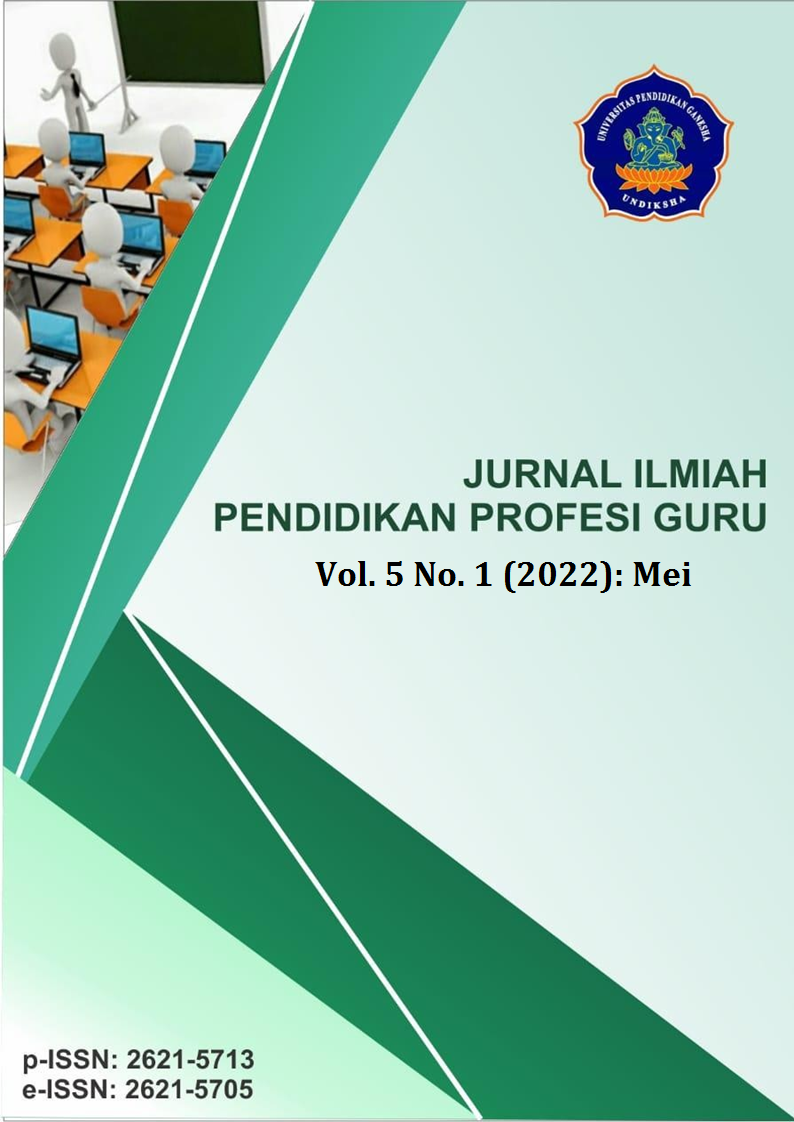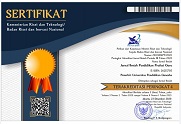Quality of E-Learning Learning During the Covid-19 Pandemic
DOI:
https://doi.org/10.23887/jippg.v5i1.32201Keywords:
Evaluation, Quality of Learning, E-Learning, SMKAbstract
Along with the increasing number of vocational schools in Indonesia, the global market demands for the quality of its graduates are also increasing. The evaluation of the quality of learning is still low. The evaluation carried out is still a formality so that it has not had an impact on subsequent activities, and the level of satisfaction of students and parents as customers is not yet known. This study aims to evaluate and reveal aspects of the quality of learning during the COVID-19 pandemic. This evaluation study uses the CIPP model with a quantitative method approach. The population is class XI students, totaling 148 people. Data collection techniques using questionnaires or questionnaires supported by data interviews and documentation. The results of the questionnaire obtained were analyzed using the technique of the percentage of respondents' level of achievement. The results showed that the average acquisition of the questionnaire on the Context, Input, Process, Product, and Outcome variables were 73.7%, 76.8%, 79.9%, 79.4% in the Fairness category. So it can be concluded that the quality of learning is categorized as quite good. With the results of this study, schools can determine the performance of each aspect of learning. It is recommended for schools to improve the quality of learning and performance in all aspects to provide excellent service for students and parents.
References
Abidin, Z., Hudaya, A., & Anjani, D. (2020). Efektivitas Pembelajaran Jarak Jauh pada Masa Pandemi Covid-19. Research and Development Journal of Education, 1(1), 131. https://doi.org/10.30998/rdje.v1i1.7659. DOI: https://doi.org/10.30998/rdje.v1i1.7659
Abuhassna, H., Al-Rahmi, W. M., Yahya, N., Zakaria, M. A. Z. M., Kosnin, A. B. M., & Darwish, M. (2020). Development of A New Model on Utilizing Online Learning Platforms to Improve Students’ Academic Achievements and Satisfaction. International Journal of Educational Technology in Higher Education, 17(1), 1–23. https://doi.org/10.1186/S41239-020-00216-Z. DOI: https://doi.org/10.1186/s41239-020-00216-z
Ahdan, S., Putri, A. R., & Sucipto, A. (2020). Aplikasi M-Learning sebagai Media Pembelajaran Conversation pada Homey English. Sistemasi, 9(3), 493. https://doi.org/10.32520/stmsi.v9i3.884. DOI: https://doi.org/10.32520/stmsi.v9i3.884
Aini, Q., Putra, P. O. H., Budiarto, M., & Rahardja, U. (2020). Exploring E-learning Challenges During the Global COVID-19 Pandemic: A Review. Jurnal Sistem Informasi (Journal of Information System), 16(2), 57–65. https://doi.org/10.21609/jsi.v16i2.1011. DOI: https://doi.org/10.21609/jsi.v16i2.1011
Albab, S. U. (2020). Analisis Kendala Pembelajaran E-Learning pada Era Disrupsi di SMK Terpadu Al-Islahiyah Singosari Malang. Mudir: Jurnal Manajemen Pendidikan, 2, 46–57. https://doi.org/10.55352/mudir.v2i1.105.
Aslan, A. (2021). Problem- Based Learning in Live Online Classes: Learning Achievement, Problem-Solving Skill, Communication Skill, and Interaction. Computers and Education, 171(November 2020), 104237. https://doi.org/10.1016/j.compedu.2021.104237. DOI: https://doi.org/10.1016/j.compedu.2021.104237
Asmuni, A. (2020). Problematika Pembelajaran Daring di Masa Pandemi Covid-19 dan Solusi Pemecahannya. Jurnal Paedagogy, 7(4), 281. https://doi.org/10.33394/jp.v7i4.2941. DOI: https://doi.org/10.33394/jp.v7i4.2941
Atiyah, U., Miarsyah, M., & Sigit, D. V. (2020). The Effect of Using E-Learning Based Guided Discovery Learning Model Based on Self-Efficacy towards Student Learning Outcomes in Biology Class in Reproductive System Subject in High School. International Journal for Educational and Vocational Studies, 2(9), 789–796. https://doi.org/10.29103/ijevs.v2i9.2732. DOI: https://doi.org/10.29103/ijevs.v2i9.2732
Bahreini, K., Nadolski, R., & Westera, W. (2016). Towards Multimodal Emotion Recognition in E-learning Environments. Interactive Learning Environments, 24(3), 590–605. https://doi.org/10.1080/10494820.2014.908927. DOI: https://doi.org/10.1080/10494820.2014.908927
Butnaru, G. I., Niță, V., Anichiti, A., & Brînză, G. (2021). The Effectiveness of Online Education During Covid 19 Pandemic—A Comparative Analysis Between The Perceptions of Academic Students and High School Students from Romania. Sustainability (Switzerland), 13(9). https://doi.org/10.3390/su13095311. DOI: https://doi.org/10.3390/su13095311
Cidral, W. A., Oliveira, T., Di Felice, M., & Aparicio, M. (2018). E-learning Success Determinants: Brazilian Empirical Study. Computers and Education, 122, 273–290. https://doi.org/10.1016/j.compedu.2017.12.001. DOI: https://doi.org/10.1016/j.compedu.2017.12.001
Dhawan, S. (2020). Online Learning: A Panacea in the Time of COVID-19 Crisis. Journal of Educational Technology Systems, 49(1), 5–22. https://doi.org/10.1177/0047239520934018. DOI: https://doi.org/10.1177/0047239520934018
Efiloğlu Kurt, Ö. (2018). Examining An E-Learning System through The Lens of The Information Systems Success Model: Empirical Evidence from Italy. Education and Information Technologies 2018 24:2, 24(2), 1173–1184. https://doi.org/10.1007/S10639-018-9821-4. DOI: https://doi.org/10.1007/s10639-018-9821-4
Enas Almanasreh, E., Moles, R., & Timothy, M. (2019). Evaluation of Methods Used for Estimating Content Validity. Research in Social and Administrative Pharmacy, 15(2), 214–221. https://doi.org/10.1016/j.sapharm.2018.03.066. DOI: https://doi.org/10.1016/j.sapharm.2018.03.066
Erni, S., Vebrianto, R., Miski, C. R., MZ, Z. A., Martius, & Thahir, M. (2020). Refleksi Proses Pembelajaran Guru MTs di Masa Pendemi Covid 19 di Pekanbaru: Dampak dan Solusi. Journal of Education and Learning, 1(1), 1–10. https://doi.org/10.55748/bjel.v1i1.1. DOI: https://doi.org/10.55748/bjel.v1i1.1
Fikri, M., Ananda, M. Z., & Faizah, N. (2021). Kendala dalam Pembelajaran Jarak Jauh di Masa Pandemi Covid-19 : Sebuah Kajian Kritis. Jurnal Education and development, 9(1), 145–148. https://doi.org/10.37081/ed.v9i1.2290.
Hamilton, L. A., Suda, K. J., Heidel, R. E., McDonough, S. L. K., Hunt, M. E., & Franks, A. S. (2020). The Role of Online Learning in Pharmacy Education: A Nationwide Survey of Student Pharmacists. Currents in Pharmacy Teaching and Learning, 12(6). https://doi.org/10.1016/j.cptl.2020.01.026. DOI: https://doi.org/10.1016/j.cptl.2020.01.026
Hidayati, T., & Husna, F. (2020). Learning English from Home During The Covid-19 : Investigating Learners ’ Experience for Online and Autonomous Learning. Journal of The Association for Arabic and English, 6(2), 202–217. https://doi.org/10.313 32/lkw.v6i2.1962. DOI: https://doi.org/10.31332/lkw.v0i0.2223
Hutauruk, A., & Sidabutar, R. (2020). Kendala Pembelajaran Daring Selama Masa Pandemi di Kalangan Mahasiswa Pendidikan Matematika: Kajian Kualiatatif Deskriptif. Journal of Mathematics Education and Applied, 02(01), 45–51. https://doi.org/10.36655/sepren.v2i1.364. DOI: https://doi.org/10.36655/sepren.v2i1.364
Ja’ashan, M. (2020). The Challenges and Prospects of Using E-learning among EFL Students in Bisha University. Arab World English Journal, 11(1), 124–137. https://doi.org/10.24093/awej/vol11no1.11. DOI: https://doi.org/10.24093/awej/vol11no1.11
Kusuma, J. W., & Hamidah. (2020). Perbandingan Hasil Belajar Matematika dengan Penggunaan Platform Whatsapp Group dan Webinar Zoom dalam Pembelajaran Jarak Jauh pada Masa Pandemik Covid 19. Jurnal Ilmiah Pendidikan Matematika, 5(1), 97–106. https://doi.org/10.26877/jipmat.v5i1.5942. DOI: https://doi.org/10.26877/jipmat.v5i1.5942
Linda, R., Zulfarina, Mas’ud, & Putra, T. P. (2021). Peningkatan Kemandirian dan Hasil Belajar Peserta Didik Melalui Implementasi E-Modul Interaktif IPA Terpadu Tipe Connected pada Materi Energi SMP/MTs. Jurnal Pendidikan Sains Indonesia, 9(2), 191–200. https://doi.org/10.24815/jpsi.v9i2.19012. DOI: https://doi.org/10.24815/jpsi.v9i2.19012
Logan, R. M., Johnson, C. E., & Worsham, J. W. (2021). Development of an E-learning Module to Facilitate Student Learning and Outcomes. Teaching and Learning in Nursing, 16(2), 139–142. https://doi.org/10.1016/j.teln.2020.10.007. DOI: https://doi.org/10.1016/j.teln.2020.10.007
Magister, P., Biologi, P., Padang, U. N., Biologi, J., Padang, U. N., & Barat, S. (2021). The Problem of Online Learning in Covid-19 toward Learning Process Problematika Pembelajaran Daring di Tengah Wabah Covid-19 terhadap Proses. Bioeducation Journal, 5(1), 19–26. https://doi.org/10.24036/bioedu.v5i1.292.
Maison, M., Kurniawan, D. A., & Anggraini, L. (2021). Perception, Attitude, and Student Awareness in Working on Online Tasks During the Covid-19 Pandemic. Jurnal Pendidikan Sains Indonesia, 9(1), 108–118. https://doi.org/10.24815/jpsi.v9i1.18039. DOI: https://doi.org/10.24815/jpsi.v9i1.18039
Mansur, H., Jumadi, Mastur, Utama, A. H., & Prastitasari, H. (2021). The Problem of Distance Learning During the Covid-19 Pandemic. Ilkogretim Online - Elementary Education Online, 20(4), 168–175. https://doi.org/10.17051/ilkonline.2021.04.19.
Mulyono, H., Suryoputro, G., & Jamil, S. R. (2021). The Application of WhatsApp to Support Online Learning During The COVID-19 Pandemic in Indonesia. Heliyon, 7(8), e07853. https://doi.org/10.1016/j.heliyon.2021.e07853. DOI: https://doi.org/10.1016/j.heliyon.2021.e07853
Nácher, M. J., Badenes-Ribera, L., Torrijos, C., & Ballesteros, M. A. (2021). The Effectiveness of The GoKoan E-Learning Platform in Improving University Students’ Academic Performance. Studies in Educational Evaluation, 70. https://doi.org/10.1016/j.stueduc.2021.101026. DOI: https://doi.org/10.1016/j.stueduc.2021.101026
Nahdi, D. S., & Jatisunda, M. G. (2020). Analisis Literasi Digital Calon Guru SD dalam Pembelajaran Berbasis Virtual Classroom di Masa Pandemi Covid-19. Jurnal Cakrawala Pendas, 6(2), 116–123. https://doi.org/10.31949/jcp.v6i2.2133. DOI: https://doi.org/10.31949/jcp.v6i2.2133
Prawiyogi, A. G., Purwanugraha, A., Fakhry, G., & Firmansyah, M. (2020). Efektifitas Pembelajaran Jarak Jauh terhadap Pembelajaran Peserta didik di SDIT Purwakarta. JPD: Jurnal Pendidikan Dasar, 11(1). https://doi.org/10.21009/10.21009/JPD.081. DOI: https://doi.org/10.21009/10.21009/JPD.081
Primasari, I. F. N. D., & Zulela. (2021). Kendala Pembelajaran Jarak Jauh (PJJ) Secara Online Selama Masa Pandemik Covid-19 di Sekolah Dasar. JIKAP PGSD: Jurnal Ilmiah Ilmu Kependidikan, 5(1), 64–73. https://doi.org/10.26858/jkp.v5i1.16820. DOI: https://doi.org/10.26858/jkp.v5i1.16820
Putra, P. D. A., & Sudarti. (2015). Pengembangan Sistem E-Learning untuk Meningkatkan Keterampilan Berpikir Kritis Mahasiswa Pendidikan Fisika. Jurnal Fisika Indonesia, 19(55), 45–48. https://doi.org/10.22146/jfi.24373. DOI: https://doi.org/10.22146/jfi.24373
Rasheed, F., & Wahid, A. (2021). Learning Style Detection in E-learning Systems Using Machine Learning Techniques. Expert Systems with Applications, 174. https://doi.org/10.1016/j.eswa.2021.114774. DOI: https://doi.org/10.1016/j.eswa.2021.114774
Rigianti, H. A. (2020). Kendala Pembelajaran Daring Guru Sekolah Dasar di Banjarnegara. Elementary School: Jurnal Pendidikan dan Pembelajaran ke-SD-an, 7(2). https://doi.org/10.31316/esjurnal.v7i2.768. DOI: https://doi.org/10.31316/esjurnal.v7i2.768
Risnani, & Husin. (2019). Section Articles Blended Learning: Pengembangan dan Implementasinya pada Mata Kuliah Fisiologi Tumbuhan. Bioeduscience, 3(2). https://doi.org/10.29405/j.bes/3274-834007. DOI: https://doi.org/10.29405/j.bes/3274-834007
Rosy, B., Ranu, M. E., Nugraha, J., & Handini, H. T. (2018). Pelatihan Media Pembelajaran Berbasis E-Learning, Schoology bagi Guru SMK Program Keahlian Administrasi Perkantoran di Kabupaten Jombang Jawa Timur. Jurnal Pemberdayaan Masyarakat Madani, 2(2). https://doi.org/10.21009/JPMM.002.2.02. DOI: https://doi.org/10.21009/JPMM.002.2.02
Sadikin, A., & Hakim, N. (2019). Pengembangan Media E-Learning Interaktif dalam Menyongsong Revolusi Industri 4. Jurnal Ilmiah Pendidikan Biologi, 5(2), 131–138. https://doi.org/10.22437/bio.v5i2.7590. DOI: https://doi.org/10.22437/bio.v5i2.7590
Sari, Sinaga, Hernani, & Solfarina. (2020). Chemistry Learning via Distance Learning during the Covid-19 Pandemic. TADRIS (Journal of Education and Teacher Training), 5(1). https://doi.org/10.24042/tadris.v5i1.6346. DOI: https://doi.org/10.24042/tadris.v5i1.6346
Satyawan, I. M., Wahjoedi, W., & Swadesi, I. K. I. (2021). The Effectiveness of Online Learning through Undiksha E-Learning During the Covid-19 Pandemic. Journal Education Technology, 5(2). https://doi.org/10.23887/jet.v5i2.32364. DOI: https://doi.org/10.23887/jet.v5i2.32364
Sudiarta, & Sadra. (2016). Pengaruh Model Blended Learning Berbantuan Video Animasi terhadap Kemampuan Pemecahan Masalah dan Pemahaman Konsep Siswa. Jurnal pendidikan dan pengajaran, 49(2), 48–58. https://doi.org/10.23887/jppundiksha.v49i2.9009. DOI: https://doi.org/10.23887/jppundiksha.v49i2.9009
Sukendro, S., Habibi, A., Khaeruddin, K., Indrayana, B., Syahruddin, S., Makadada, F. A., & Hakim, H. (2020). Using an Extended Technology Acceptance Model to Understand Students’ Use of E-Learning During Covid-19: Indonesian Sport Science Education Context. Heliyon, 6(11), e05410. https://doi.org/10.1016/j.heliyon.2020.e05410. DOI: https://doi.org/10.1016/j.heliyon.2020.e05410
Suni Astini, N. K. (2020). Tantangan dan Peluang Pemanfaatan Teknologi Informasi dalam Pembelajaran Online Masa Covid-19. Cetta: Jurnal Ilmu Pendidikan, 3(2), 241–255. https://doi.org/10.37329/cetta.v3i2.452. DOI: https://doi.org/10.37329/cetta.v3i2.452
Sutrisna, I. P. E., Putu, N., & Utami, D. (2021). The Effectivness of E-Learning for English Class in Efl Setting and Its Implication During Covid-19 Pandemic. Language and Education Journal Undiksha, 4(1), 13–21. https://doi.org/10.23887/leju.v4i1.27373.
Syafiq, A. N., Rahmawati, A., Anwari, & Oktaviana, T. (2021). Increasing Speaking Skill through Youtube Video as English Learning Material During Online Learning in Pandemic Covid-19. ELSYA: Journal of English Language Studies, 3(1). https://doi.org/10.31849/elsya.v3i1.6206. DOI: https://doi.org/10.31849/elsya.v3i1.6206
Tavakol, M., & Sandars, J. (2014). Quantitative and Qualitative Methods in Medical Education Research: AMEE Guide No 90: Part II. Medical Teacher, 36, 838–848. https://doi.org/10.3109/0142159X.2014.915297. DOI: https://doi.org/10.3109/0142159X.2014.915297
Tempelaar Chan, S. L., Lin, C. C., Chau, P. H., Takemura, N., & Fung, J. T. C. (2021). Evaluating Online Learning Engagement of Nursing Students. Nurse Education, 104. https://doi.org/10.1016/j.nedt.2021.104985. DOI: https://doi.org/10.1016/j.nedt.2021.104985
Valverde-Berrocoso, Garrido-Arroyo, Burgos-Videla, & Morales-Cevallos. (2020). Trends in Educational Research about e-Learning: A Systematic Literature Review (2009–2018). Sustainability, 12(12). https://doi.org/10.3390/su12125153. DOI: https://doi.org/10.3390/su12125153
Wulandari, Sudatha, & Simamora. (2020). Pengembangan Pembelajaran Blended pada Mata Kuliah Ahara Yoga Semester II di IHDN Denpasar. Jurnal Edutech Undiksha, 8(1), 1–15. https://doi.org/10.23887/jeu.v8i1.26459. DOI: https://doi.org/10.23887/jeu.v8i1.26459
Yati, F., & Yaswinda, Y. (2019). Penerapan Model Evaluasi CIPP dalam Mengevaluasi Penyelenggaraan Lembaga PAUD. Jurnal Obsesi Jurnal Pendidikan Anak Usia Dini, 4(1). https://doi.org/10.31004/obsesi.v4i1.238. DOI: https://doi.org/10.31004/obsesi.v4i1.238
Yusuf, I., & Widyaningsih, S. W. (2020). Implementing E-Learning-Based Virtual Laboratory Media to Students’ Metacognitive Skills. International Journal of Emerging Technologies in Learning, 15(5). https://doi.org/10.3991/ijet.v15i05.12029. DOI: https://doi.org/10.3991/ijet.v15i05.12029
Zhang, D., Zhou, L., Briggs, R. O., & Nunamaker, J. F. (2016). Instructional Video in E-Learning: Assessing The Impact of Interactive Video on Learning Efectiveness. Information and Management, 43(1), 15–27. https://doi.org/10.1016/j.im.2005.01.004. DOI: https://doi.org/10.1016/j.im.2005.01.004
Downloads
Published
How to Cite
Issue
Section
License
Copyright (c) 2022 Despa Wandri, Nizwardi Jalinus

This work is licensed under a Creative Commons Attribution-ShareAlike 4.0 International License.

Jurnal Ilmiah pendidikan profesi guru is licensed under a Creative Commons Attribution-ShareAlike 4.0 International License.






